How To Invest In Foreign Currency



Editorial Note: While we adhere to strict Editorial Integrity, this post may contain references to products from our partners. Here's an explanation for How We Make Money. None of the data and information on this webpage constitutes investment advice according to our Disclaimer.
The following methods can be used to invest in foreign currency:
- Foreign Currency Accounts - Easy to understand, low returns, high fees
- Forex Trading - Requires skill, high-risk-high-return trade-off
- Currency ETFs - Allows for market exposure and access to liquidity
- Currency Futures - Allows for leverage, requires posting of margin
- Currency Options - Low cost, high-risk-high-return trade-off
- Cryptocurrency - Highly volatile, very-high-risk-return trade-off
Foreign currency investment involves trading or holding money from different countries. It offers high potential returns but comes with significant risks due to market volatility and leverage. Investing in foreign currency can be a profitable venture if approached with the right knowledge and strategy. Understanding the different methods of investing, from Forex trading to currency ETFs, is essential for success.
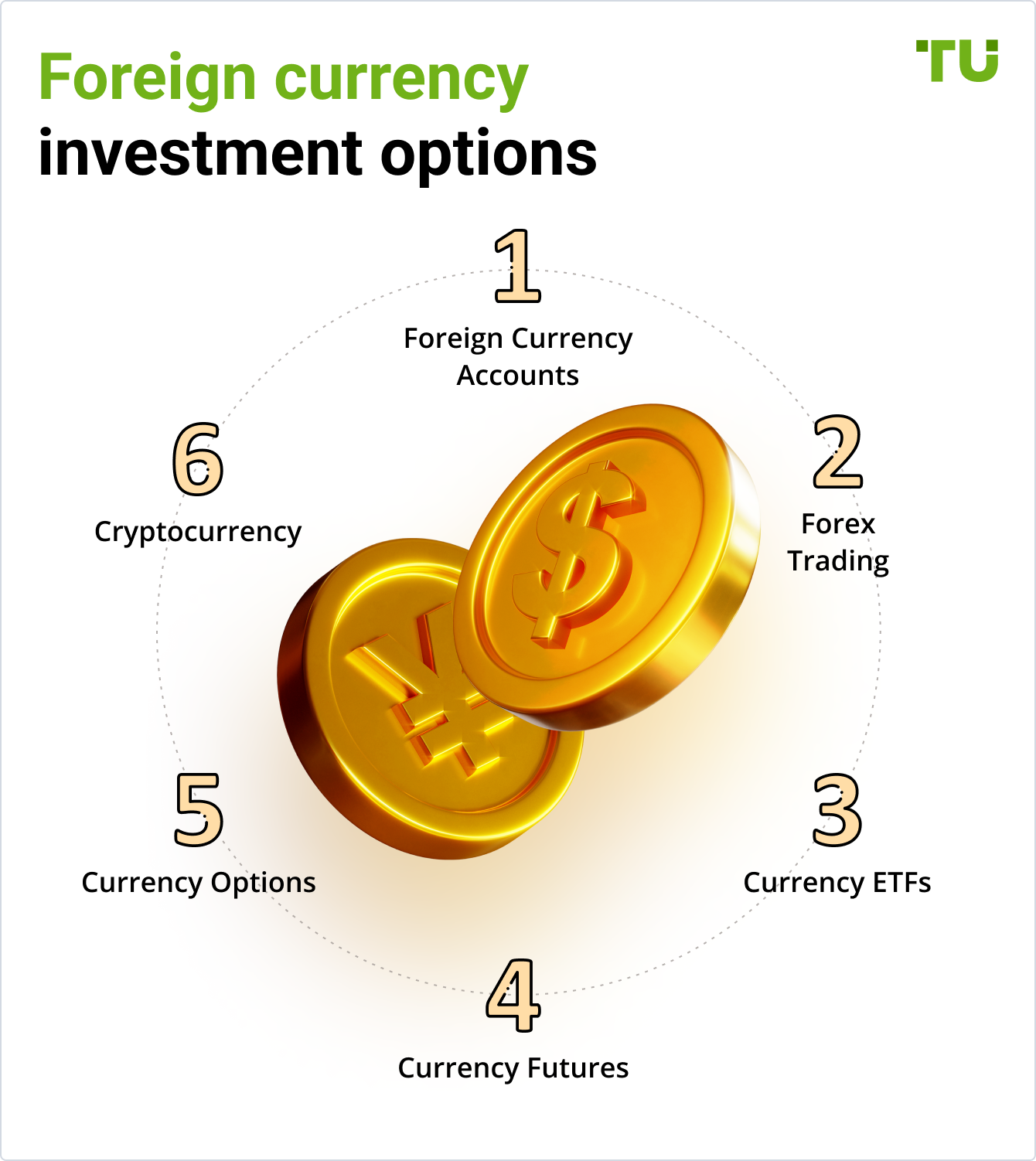
Investing in foreign currency can be approached through several methods, each with its unique features and risks.
Foreign Currency Accounts
Holding foreign currencies in a bank account is a straightforward way to invest in foreign currency. These accounts offer low risk and easy access but generally provide low returns and are subject to currency risk. Investors can open a multi-currency savings account and hold the currency of their choice to gain exposure.
Forex Trading
Forex trading involves buying and selling currencies directly on the Forex market. This market operates 24 hours a day, five days a week, providing high liquidity and numerous trading opportunities. Forex trading requires significant knowledge and skill, as the Forex market is highly volatile. Based on the currency outlook, investors can hold a specific currency for a short, medium, or long time frame and exit the same once they have achieved the target return.
Currency ETFs
Currency exchange-traded funds (ETFs) track the performance of currency indices. They offer a way to invest in foreign currencies without dealing directly with the Forex market. Currency ETFs provide diversification and lower risk compared to direct Forex trading, but they come with management fees.
Currency Futures
Currency futures are contracts to buy or sell a currency at a future date and a predetermined price. These contracts are standardized and traded on exchanges, providing transparency and reducing counterparty risk. However, they involve high leverage and complexity, making them suitable for experienced traders.
Currency Options
Currency options give the right, but not the obligation, to buy or sell a currency at a specified price before a certain date. They provide flexibility and limited loss potential but involve premium costs and can be complex to understand.
Cryptocurrency
Investing in digital currencies like Bitcoin and Ethereum is becoming increasingly popular. Cryptocurrencies offer high growth potential and decentralization but are highly volatile and subject to regulatory risks.
| Investment Option | Cost Involved | Key Risks | Risk:Reward Trade-off | Associated Costs |
|---|---|---|---|---|
Foreign Currency Accounts | Varies by bank | Currency risk | Low | Exchange fees, account maintenance fees |
Forex Trading | Minimum deposit of $100-$500 | Market risk, Leverage risk | High | Spreads, commission fees |
Currency ETFs | Unit price of ETF | Market risk | Moderate | Purchase costs, management fees |
Currency Futures | Margin requirements | Leverage risk | High | Commission fees |
Currency Options | Premium paid | Volatility risk, Interest rate risk | High | Commission fees |
Cryptocurrency | Varies by platform | Volatility risk, regulatory risk | Very high | Exchange fees, wallet costs |
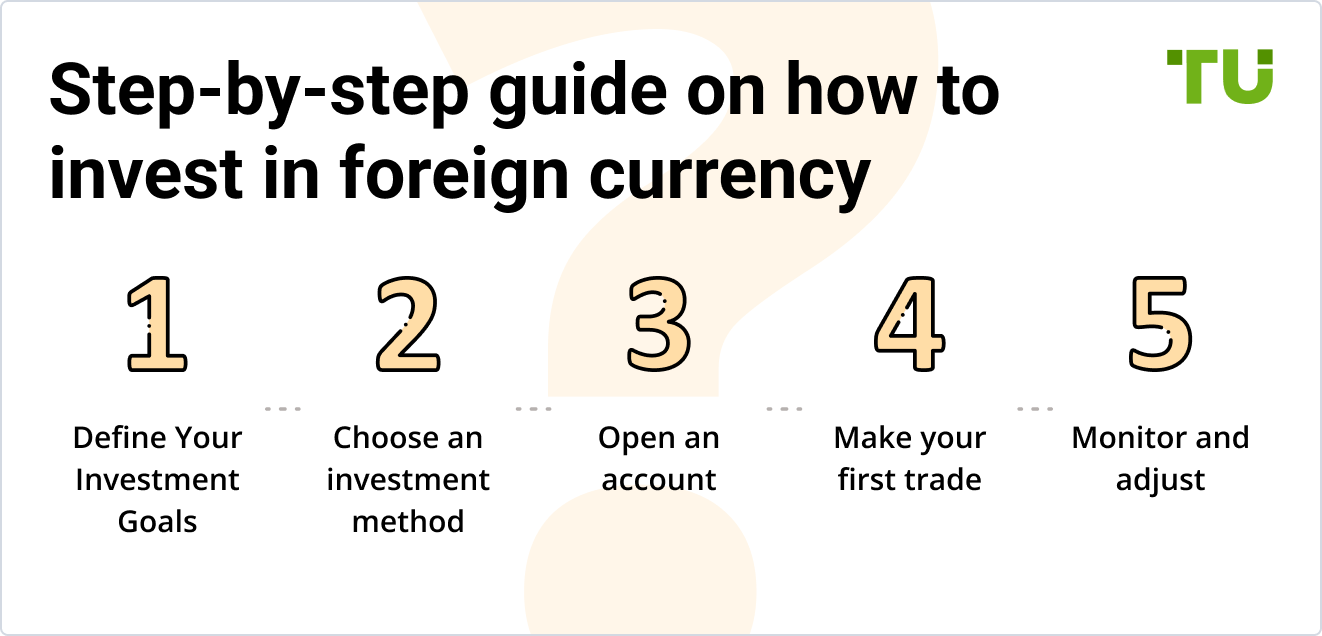
Investing in foreign currency can be a rewarding venture if approached with the right knowledge and strategy.
Define Your Investment Goals
Short-term vs. Long-term: Decide whether you're looking for quick gains or aiming for long-term growth. Short-term investments might involve more frequent trading and higher risks, while long-term investments generally focus on steady growth and stability.
Risk Tolerance: Assess your comfort level with risk. Are you okay with the potential for significant losses in exchange for higher rewards, or do you prefer safer, more predictable returns? Your risk tolerance will shape your overall investment strategy.
Specific Targets: Set clear and achievable financial goals. It can be aiming for a specific return on investment, saving for a future expense, or building a retirement fund. Having precise targets will guide your decisions.
Choose an investment method
Forex Trading: Trade currencies directly on the Forex market. This involves buying and selling currency pairs based on their exchange rates.
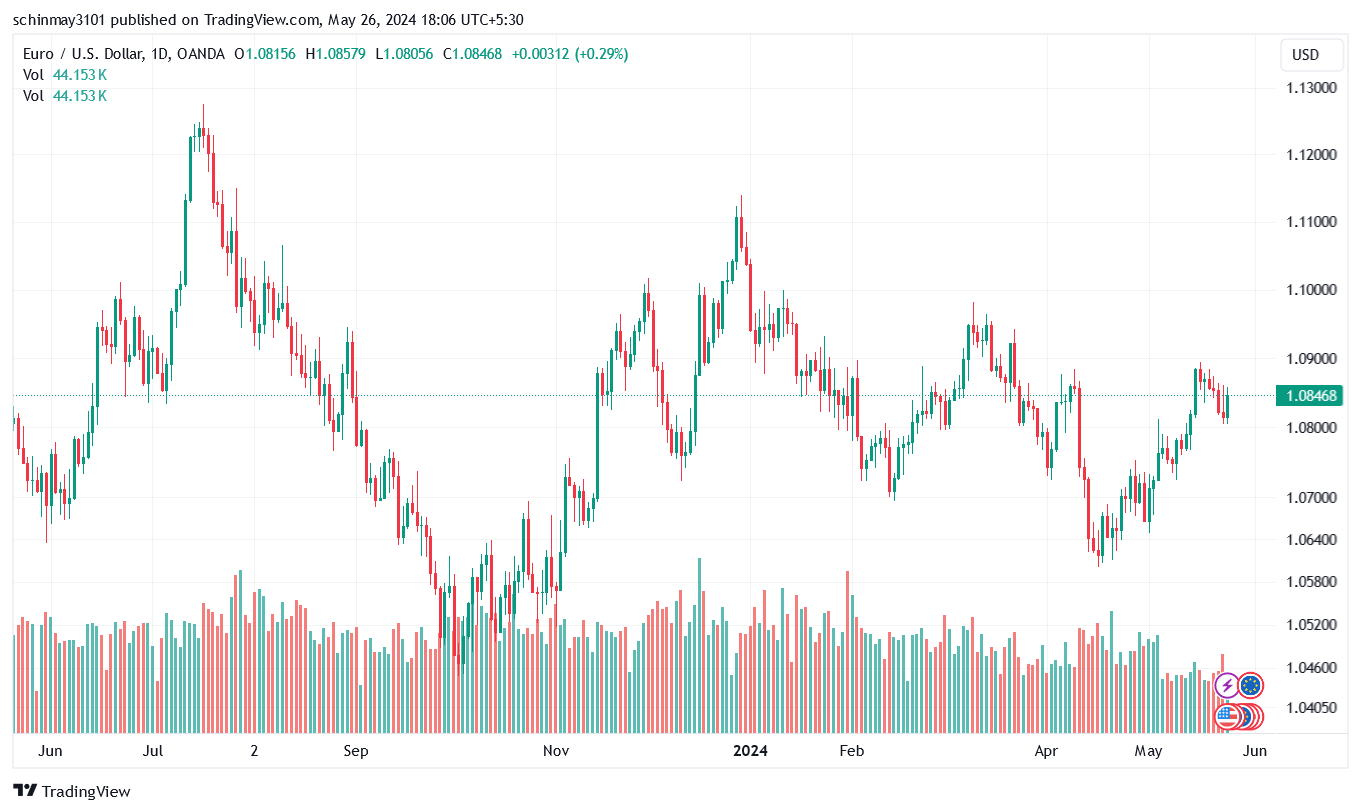 Chart of EUR/USD Pair
Chart of EUR/USD PairCurrency ETFs: Currency exchange-traded funds track currency indices. These funds offer a way to gain exposure to currency movements without trading directly in the Forex market.
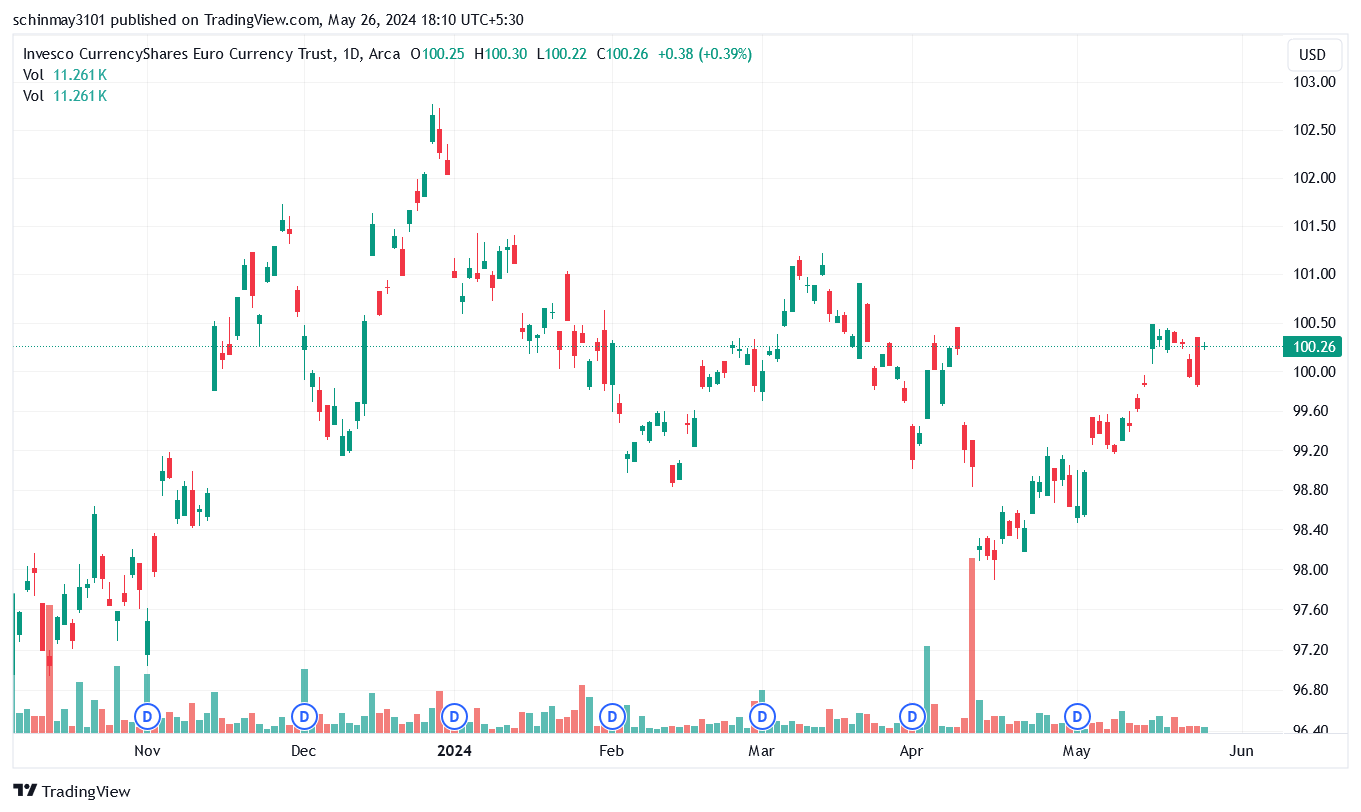 Chart of Invesco CurrencyShares Euro Currency Trust ETF
Chart of Invesco CurrencyShares Euro Currency Trust ETFCurrency Futures and Options: Investors can use contracts to buy or sell currencies at a future date or a predetermined price. Futures and options can help manage risk and speculate on currency movements.
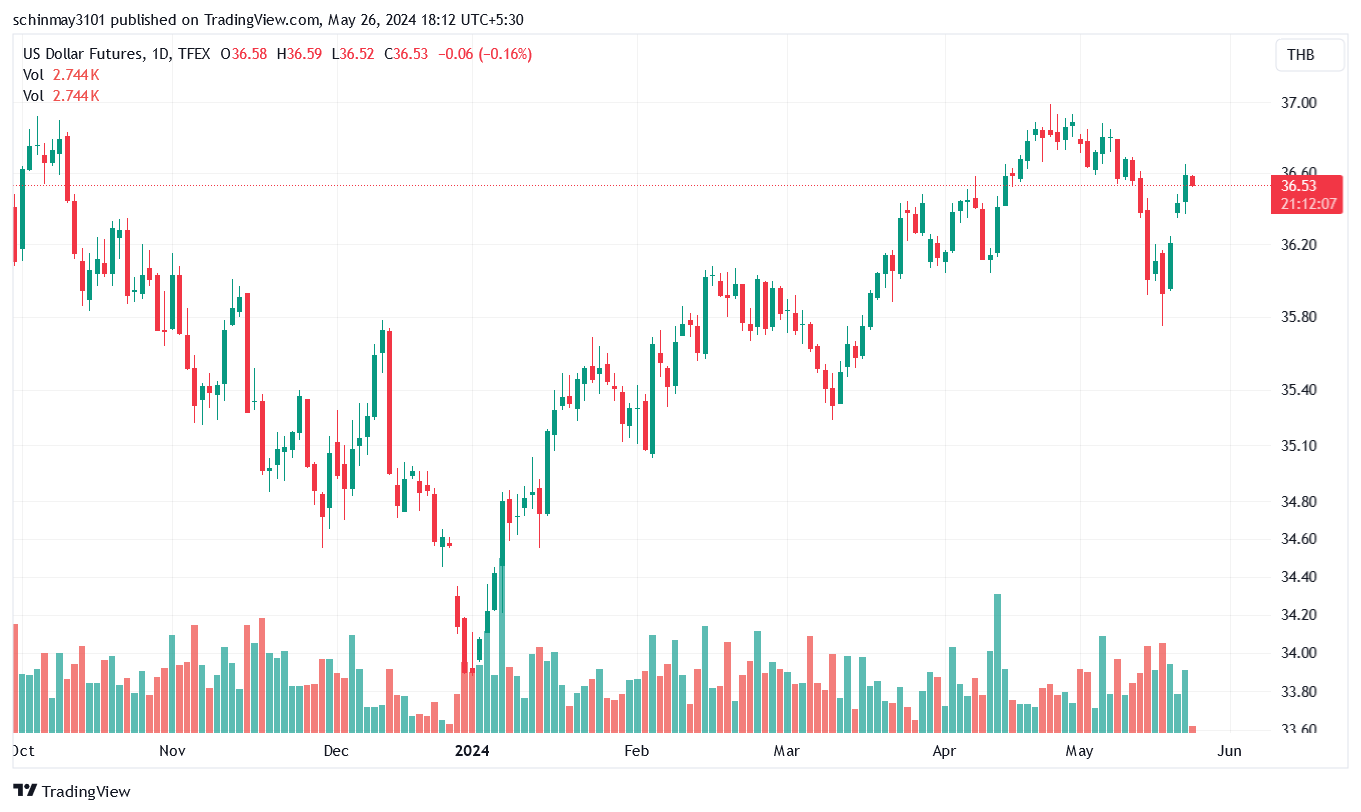 Chart of US Dollar Futures
Chart of US Dollar FuturesForeign Currency Accounts: Hold foreign currencies in a bank account. This method is straightforward and involves earning interest in a foreign currency.
Cryptocurrency: Digital currencies like USDT are relatively newer options that can offer high returns but come with significant volatility and risk.
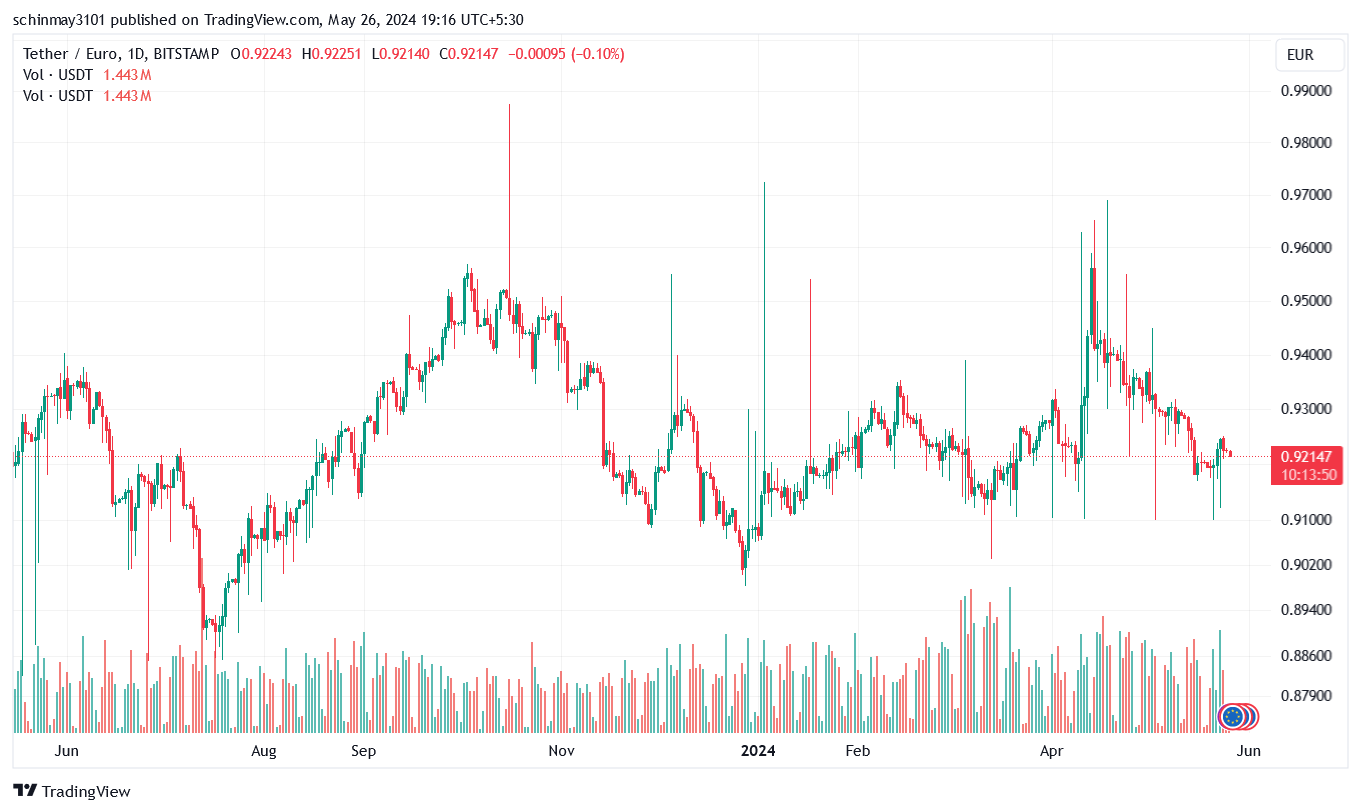 Chart of USDT/EUR
Chart of USDT/EUROpen an account
Research brokers: Compare brokers based on fees, services, and reliability. Look for brokers with good reputation, user-friendly trading platforms, and customer support.
| Min. deposit, $ | Deposit fee, % | Withdrawal fee, % | Investor protection | Currency pairs | FX options | Futures | ETFs | Open account | |
|---|---|---|---|---|---|---|---|---|---|
| 100 | No | No | £85,000 €20,000 | 40 | No | No | No | Open an account Your capital is at risk. |
|
| 5 | No | No | £85,000 €20,000 | 57 | No | No | No | Open an account Your capital is at risk. |
|
| 10 | No | No | No | 60 | No | No | Yes | Open an account Your capital is at risk. |
|
| No | No | No | No | 61 | No | No | No | Open an account Your capital is at risk. |
|
| 100 | No | 1-3 | No | 55 | No | No | Yes | Open an account Your capital is at risk. |
Register: Complete the registration process, providing necessary identification and financial information.
Fund your account: Deposit the required minimum amount to start trading.Ensure you understand the funding process and any associated fees.
Make your first trade
Choose a currency pair: Select a currency pair to trade based on your analysis.
Analyze the market: Use technical and fundamental analysis to determine the best entry point. Technical analysis involves studying price charts and patterns, while fundamental analysis looks at economic indicators and news.
Place your order: Execute the trade using your broker’s trading platform, specifying the amount and type of order (e.g., market order, limit order).
Monitor and adjust
Track performance: Monitor the performance of your investments and compare them to your goals.
Stay informed: Keep up with market news and economic indicators that may affect your investments.
Adjust strategies: Make necessary adjustments to your portfolio based on market conditions and performance reviews.
Pros and cons of each investment option
The following table summarizes the key pros and cons for each Forex investment option discussed above.
| Investment Option | Pros | Cons |
|---|---|---|
Foreign Currency Accounts | Low risk, easy access | Low returns, high account fees |
Forex Trading | High liquidity, 24-hour market | High risk, requires significant knowledge |
Currency ETFs | Diversification, high liquidity | Management fees, requires understanding of the ETF market |
Currency Futures | Allows for leverage, low counterparty risk owing to standardization | Margin requirements, complexity |
Currency Options | Flexibility, limited loss potential | Premium costs, complexity |
Cryptocurrency | High growth potential, decentralization | High volatility, high regulatory risk |
Investing in foreign currency: Key considerations for beginners
For beginners venturing into Forex investing, the following key tips can reduce their learning curve.
Learn the Basics
Key Terms. Familiarize yourself with essential Forex terms like pips, spreads, leverage, and margin.
Market Dynamics. Learn how the Forex market operates, including market hours, major currency pairs, and the factors that influence currency prices.
Technical Analysis. Understand the basics of technical analysis, including reading charts, identifying trends, and using indicators like moving averages.
Start with Demo Accounts
Risk-Free Learning. Demo accounts allow you to practice trading with virtual money, enabling you to learn and make mistakes without any financial risk.
Familiarization with Platforms. Using a demo account helps you become comfortable with the trading platform's tools and features before committing real money.
Testing Strategies. You can test different trading strategies to see what works best for you without the pressure of losing real money.
Risk Management
Set Stop-Loss Orders. Always use stop-loss orders to limit potential losses on a trade. This helps protect your capital and manage risk effectively.
Use Proper Position Sizing. Calculate the appropriate position size for each trade based on your account size and risk tolerance. Avoid risking more than a small percentage of your capital on a single trade.
Diversify Your Trades. Spread your investments across different currency pairs to reduce the impact of any single trade's poor performance.
Investing in foreign currency: Key considerations for advanced traders
As an experienced trader, refining your strategies and leveraging sophisticated tools can enhance your trading success. Here you find advanced strategies and considerations, focusing on in-depth technical analysis, macro-economic analysis, and algorithmic trading.
Advanced Technical Analysis
Fibonacci Retracement. Fibonacci levels help in identifying potential support and resistance levels in the market. They are based on the idea of the fibonacci sequence, which can be observed across a variety of things in nature.
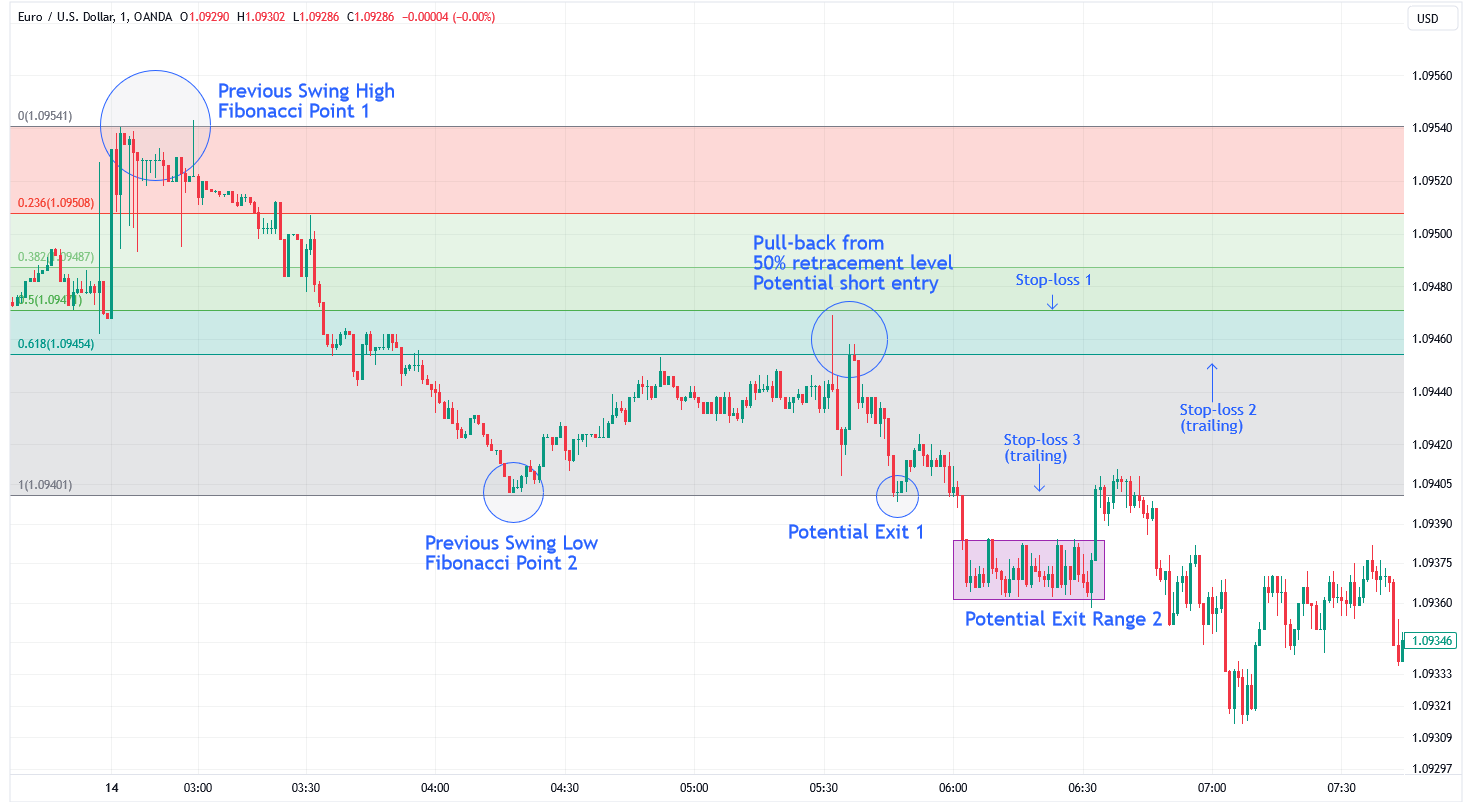 Fibonacci Retracement Strategy
Fibonacci Retracement StrategyExample: A trader notices that the EUR/USD pair has been in a downtrend. After a significant downward move, the price starts to retrace. The trader uses Fibonacci retracement levels to identify potential resistance levels. The 61.8% retracement level aligns with a previous resistance zone. The trader enters a short position at this level, anticipating the downtrend will resume.
Bollinger Bands. Understanding how Bollinger Bands work can help you identify overbought and oversold conditions, as well as potential breakout points. This indicator primarily derives signals using the idea of volatility and mean reversion.
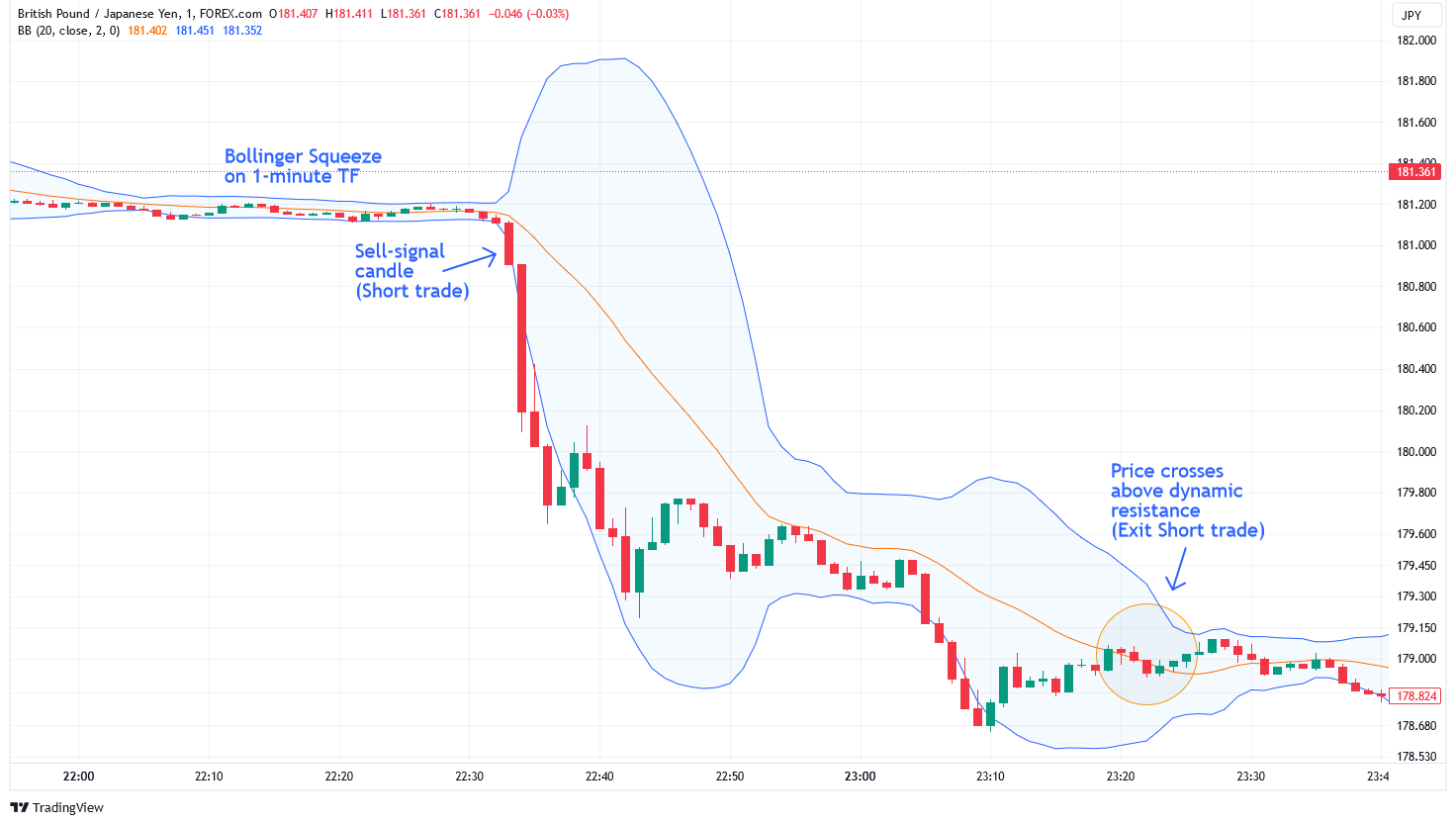 Bollinger Bands Strategy
Bollinger Bands StrategyExample: A trader observes that the GBP/JPY pair is trading within a tight range (referred to as a bollinger squeeze). The price approaches the lower Bollinger Band, indicating a potential breakout. The trader decides to enter a short position, expecting the price to make a quick downmove. The trader sets a target near the mean reversion level, i.e. the dynamic resistance band and places a stop-loss above the upper band at the time of entry.
Ichimoku Cloud. The Ichimoku Cloud indicator helps in identifying market trends, momentum, and potential reversal points. If the price is above the cloud, it is a signal for a prevailing uptrend, and vice versa.
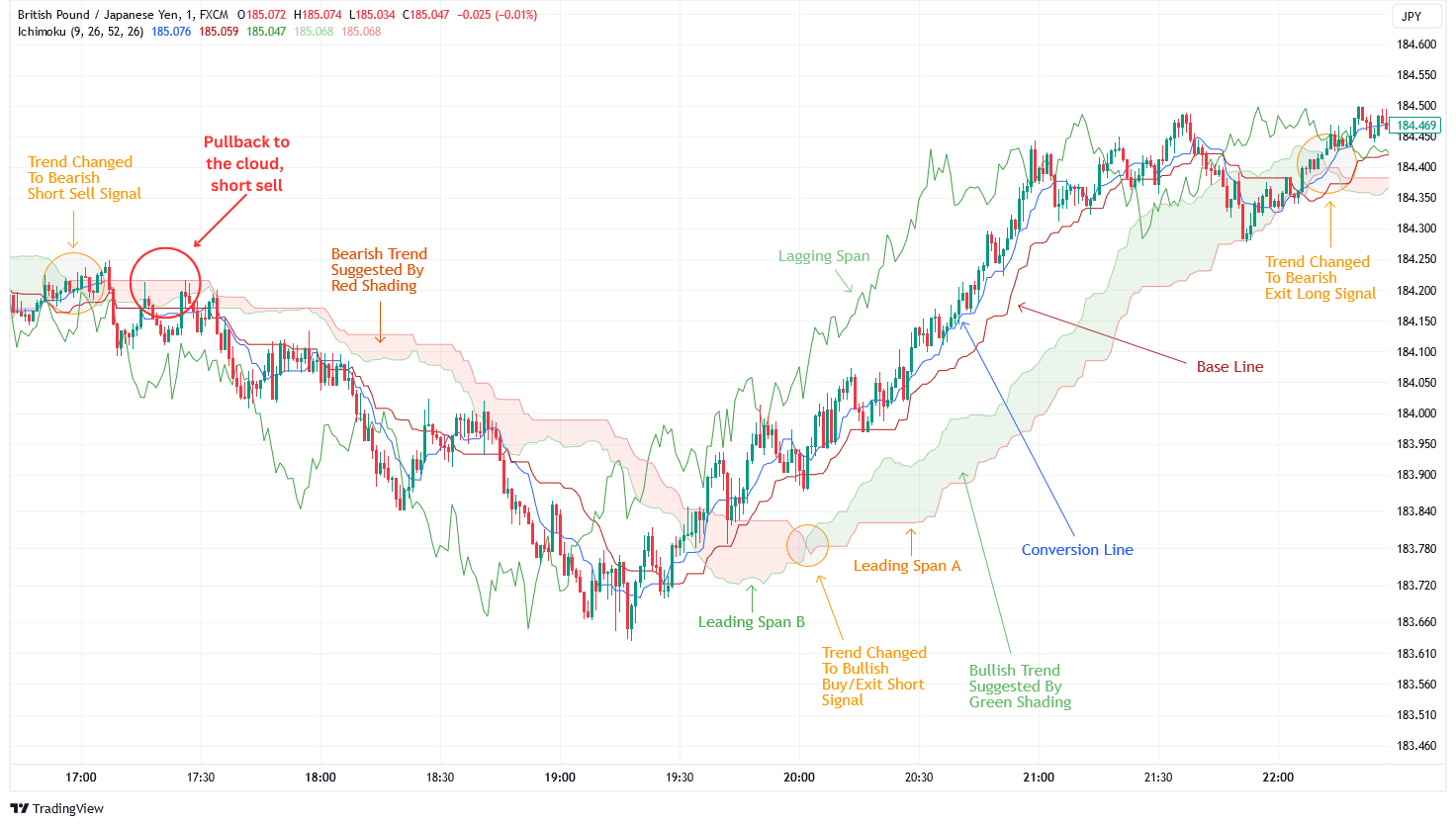 Ichimoku Cloud Strategy
Ichimoku Cloud StrategyExample: A trader uses the Ichimoku Cloud to analyze the GBP/JPY pair. The price breaks below the cloud, indicating a bearish trend. The trader waits for a pullback to the cloud (acting as resistance) to enter a short position. The trader sets a target based on the next trend change as per the cloud and uses the cloud's upper boundary as a stop-loss level.
Macro-Economic Analysis
GDP Growth Rates. Gross Domestic Product (GDP) growth rates are a key indicator of a country’s economic health. When a country experiences strong GDP growth, it signals a strong economy with increasing productivity, higher employment rates, and greater consumer spending. This positive economic outlook often boosts investor confidence and attracts foreign investment, leading to an appreciation of the country’s currency.
Interest Rates. Interest rates set by central banks are another crucial factor influencing currency values. When a central bank, such as the Federal Reserve in the US or the Bank of England in the UK, raises interest rates, it often leads to a stronger currency. Higher interest rates provide better returns on investments denominated in that currency, attracting foreign capital and increasing demand for the currency.
Inflation Rates. Inflation rates, which measure how fast prices for goods and services rise, are important for currency strength. Low and stable inflation usually indicates economic stability, while high inflation can decrease a currency's value.
Geopolitical Events. Geopolitical events, such as elections, trade agreements, and conflicts, can significantly impact currency markets. Political stability or instability, policy changes, and international relations all influence investor sentiment and currency values.
Algorithmic Trading
Automated Trading Systems. Such systems execute trades automatically based on predefined criteria. These systems follow specific rules and signals, which helps improve trading efficiency and eliminate the emotional biases that often affect manual trading decisions.
Backtesting. Backtesting is a crucial step in developing a successful trading strategy. It involves testing a trading strategy using historical market data to see how it would have performed in the past. This process helps traders evaluate the effectiveness of their strategies and make necessary adjustments before applying them in live trading.
High-Frequency Trading (HFT). High-Frequency Trading (HFT) is a method where traders buy and sell financial instruments very quickly, often within milliseconds. These traders use complex computer programs and the latest technology to spot and take advantage of small price differences in the market.
Risk and warning section
Investing in foreign currency comes with inherent risks. This section highlights the potential pitfalls and provides general warnings to help you navigate the complexities of the Forex market.
Market Volatility
Market volatility can lead to significant price swings, affecting the value of your investments. Understanding and preparing for these fluctuations is crucial to manage risk effectively.
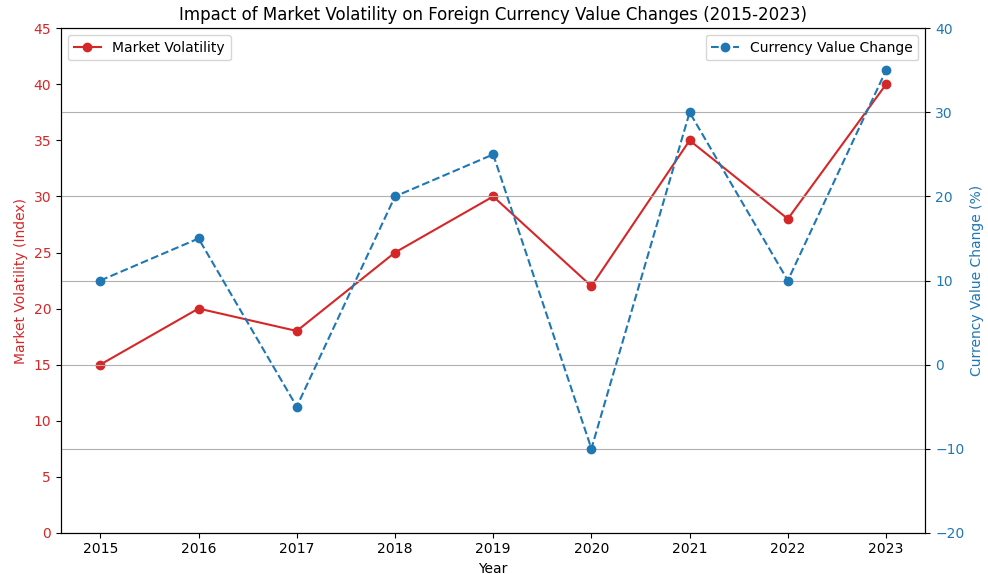 Impact of Market Volatility on Foreign Currency Value Changes (2015-2023)
Impact of Market Volatility on Foreign Currency Value Changes (2015-2023)Economic Downturns
Economic downturns can lead to currency depreciation and increased volatility, posing risks to your investments. It's important to monitor economic indicators and be prepared for potential downturns.
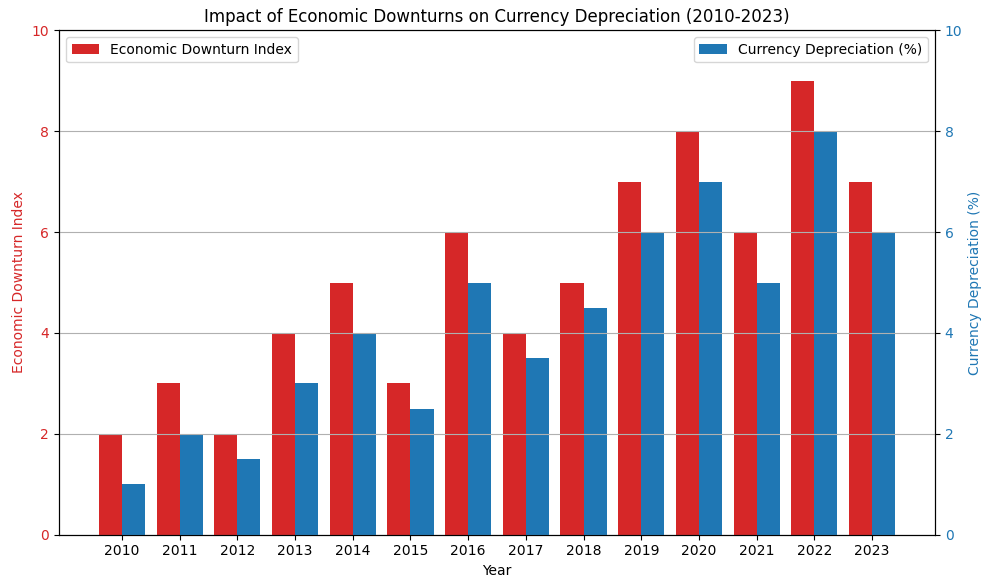 Impact of Economic Downturns on Currency Depreciation (2010-2023)
Impact of Economic Downturns on Currency Depreciation (2010-2023)Geopolitical Risks
Geopolitical events, such as elections, trade wars, and conflicts, can have a significant impact on currency values. Staying informed about global political developments helps mitigate these risks.
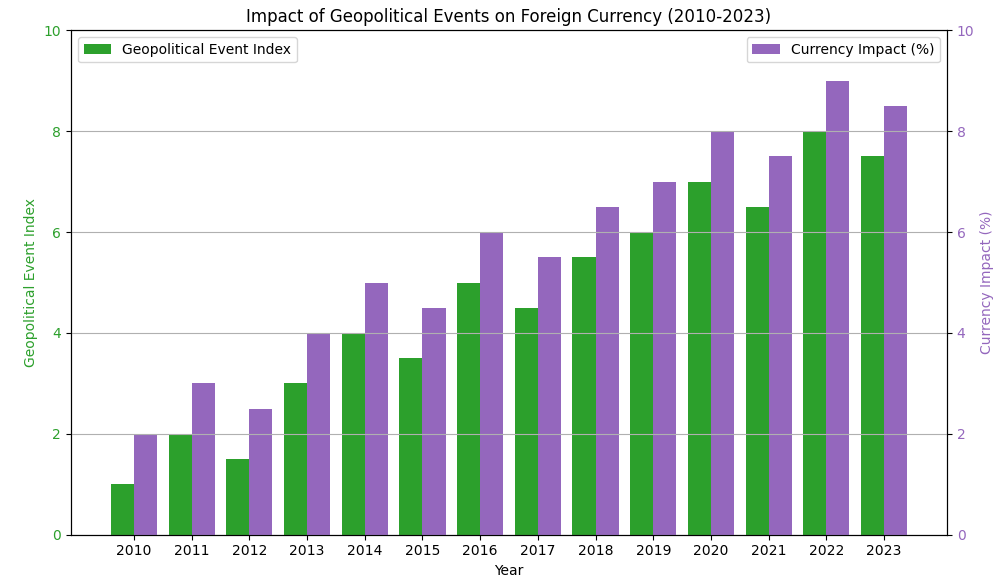 Impact of Geopolitical Events on Foreign Currency (2010-2023)
Impact of Geopolitical Events on Foreign Currency (2010-2023)How to succeed in the foreign currency market
Investing in foreign currency can be a highly rewarding venture, but it requires careful planning, strategic thinking, and a deep understanding of the market. As an experienced Forex trader, I recommend focusing on the following key areas to enhance your trading success and mitigate potential risks.
Understand the Market Fundamentals. Grasp how currency pairs work and the key economic indicators that influence exchange rates. This foundational knowledge is crucial for making informed trading decisions.
Choose a Reputable Forex Broker. Select a regulated broker with a robust trading platform, competitive fees, and excellent customer service. A good broker also provides valuable educational resources.
Develop a Solid Trading Strategy. Create a clear trading plan with defined entry and exit points, risk management rules, and position sizing guidelines. Tailor your strategy to your risk tolerance and trading goals.
Implement Strong Risk Management Practices. Use stop-loss orders and never risk more than a small percentage of your capital on a single trade. Diversify your investments to spread risk and protect your capital.
Stay Informed and Adapt to Market Conditions. Keep up with global economic events and market trends. Regularly review and adjust your trading strategy to stay aligned with changing market conditions. Continuous learning is essential for success.
Investing in foreign currency offers unique opportunities but also comes with its own set of challenges. By focusing on these key areas you can navigate the complexities of the Forex market more effectively. Remember, success in Forex trading requires a combination of knowledge, discipline, and adaptability. Keep learning, stay disciplined, and adjust your strategies as needed to achieve your trading goals.
Conclusion
Investing in foreign currency offers many opportunities, but it requires a good understanding of the market and smart strategies. Whether you're a beginner or an advanced trader, it's important to start with a strong foundation. For beginners, starting with demo accounts and learning the basics can help you avoid common pitfalls. Advanced traders can focus on refining their strategies with technical analysis and algorithmic trading. By managing risks effectively and making disciplined decisions, you can invest in the Forex market and make sound choices.
FAQs
How much money do I need to start investing in foreign currency?
For Forex trading, brokers typically require a minimum deposit ranging from $100 to $500. For currency ETFs, you can start with the price of one share, while for currency futures and options, margin requirements and premium costs will apply.
What are the risks of investing in foreign currency?
Investing in foreign currency involves several risks, including market volatility, economic downturns, geopolitical events, and currency depreciation.
What are the benefits of investing in foreign currency?
Investing in foreign currency can offer diversification, potential for high returns, and a hedge against inflation and domestic economic instability. It provides exposure to global markets and can enhance the overall risk-return profile of an investment portfolio.
What are currency ETFs and how do they work?
Currency exchange-traded funds (ETFs) are investment funds that track the performance of a currency or a basket of currencies. They are traded on stock exchanges like regular shares.
Related Articles
Team that worked on the article
Ivan is a financial expert and analyst specializing in Forex, crypto, and stock trading. He prefers conservative trading strategies with low and medium risks, as well as medium-term and long-term investments. He has been working with financial markets for 8 years. Ivan prepares text materials for novice traders. He specializes in reviews and assessment of brokers, analyzing their reliability, trading conditions, and features.

Dr. BJ Johnson is a PhD in English Language and an editor with over 15 years of experience. He earned his degree in English Language in the U.S and the UK. In 2020, Dr. Johnson joined the Traders Union team. Since then, he has created over 100 exclusive articles and edited over 300 articles of other authors.
Mirjan Hipolito is a journalist and news editor at Traders Union. She is an expert crypto writer with five years of experience in the financial markets. Her specialties are daily market news, price predictions, and Initial Coin Offerings (ICO).
Cryptocurrency is a type of digital or virtual currency that relies on cryptography for security. Unlike traditional currencies issued by governments (fiat currencies), cryptocurrencies operate on decentralized networks, typically based on blockchain technology.
Volatility refers to the degree of variation or fluctuation in the price or value of a financial asset, such as stocks, bonds, or cryptocurrencies, over a period of time. Higher volatility indicates that an asset's price is experiencing more significant and rapid price swings, while lower volatility suggests relatively stable and gradual price movements.
A Forex trading scam refers to any fraudulent or deceptive activity in the foreign exchange (Forex) market, where individuals or entities engage in unethical practices to defraud traders or investors.
Economic indicators — a tool of fundamental analysis that allows to assess the state of an economic entity or the economy as a whole, as well as to make a forecast. These include: GDP, discount rates, inflation data, unemployment statistics, industrial production data, consumer price indices, etc.
HFX trading likely refers to high-frequency forex trading, where automated algorithms execute a large number of trades at extremely high speeds.






























































































































